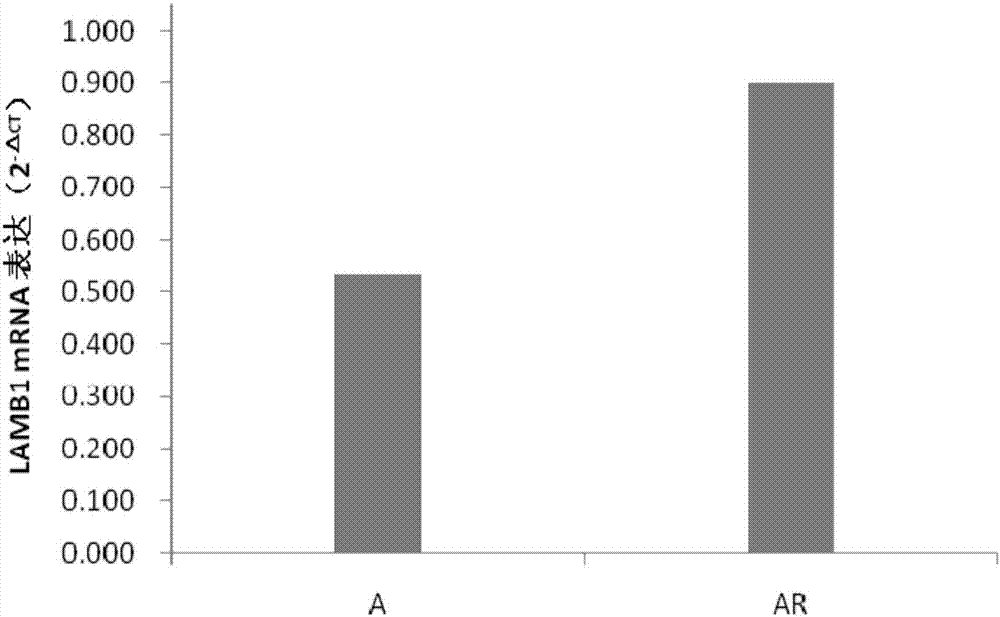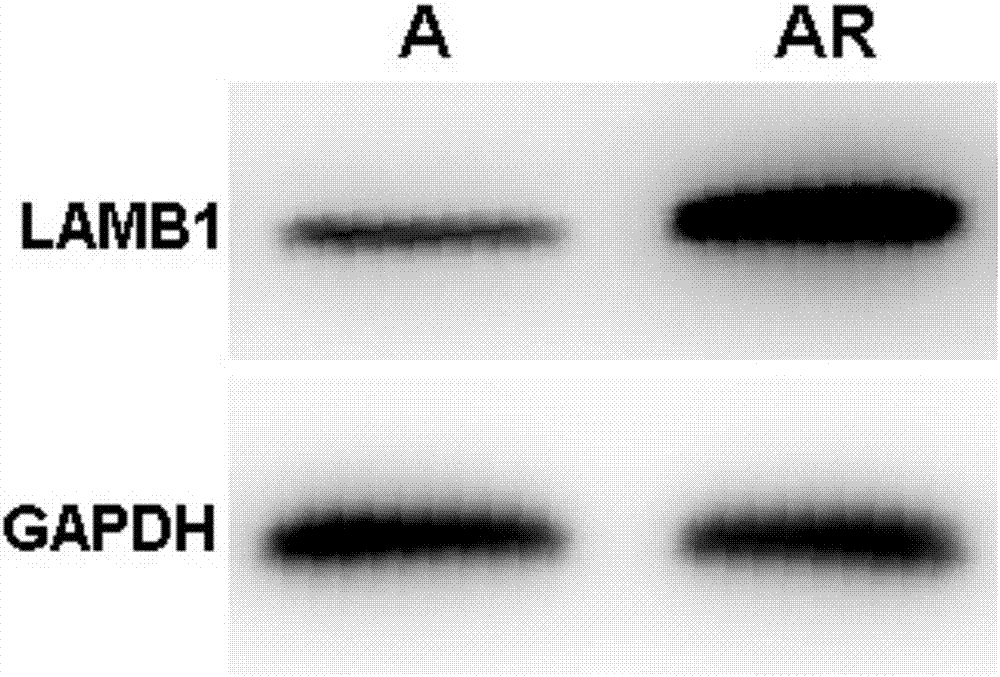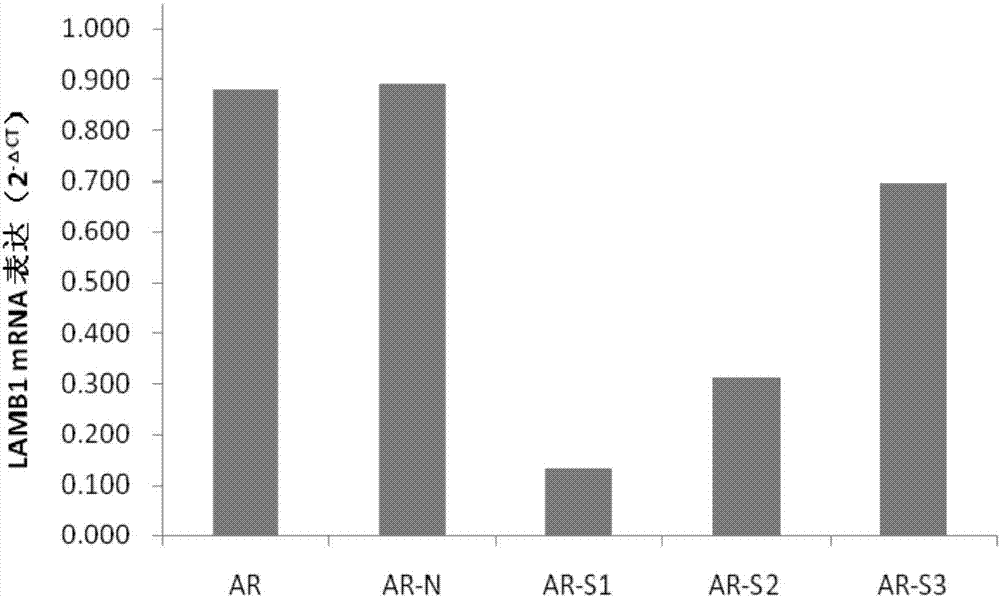siRNA capable of specially inhibiting expression of LAMB1 gene and recombinant vector and application of siRNA
A gene expression and recombinant vector technology, applied in the fields of molecular biology and biomedicine, to achieve the effect of reversing drug resistance, reducing cell migration and invasion ability, and improving sensitivity
- Summary
- Abstract
- Description
- Claims
- Application Information
AI Technical Summary
Problems solved by technology
Method used
Image
Examples
Embodiment 1
[0063] Example 1. Study on the Difference of LAMB1 Expression in Ovarian Cancer Cell Line A2780 and Its Taxol-resistant Cell Line A2780 / Taxol
[0064] 1. Detection of LAMB1 gene mRNA expression by real-time fluorescent quantitative RT-PCR (qRT-PCR)
[0065] After culturing for 48 hours, the medium in the 6-well plate was discarded, washed twice with PBS, and the total RNA was extracted with Trizol. The RNA concentration was measured with a ThermoNano Drop2000 spectrophotometer, and the operation was performed according to the instructions of the SYBR Premix Ex Taq (perfect Real time) kit. . The first step is RNA denaturation. Reaction system: RNA 0.5ug, make up to 6.8ul with RNase-free DEPC water; reaction conditions: incubate at 70°C for 10min and place on ice. The second step is reverse transcription. Reaction system: perform reverse transcription according to PrimeScript RTMaster Mix kit instructions; reaction conditions: incubate at 42°C for 60 minutes, inactivate at 85...
Embodiment 2
[0075] Embodiment 2. LAMB1 siRNA design and synthesis
[0076]The LAMB1 gene mRNA sequence (NM_002291.2) was found in Genebank, and 3 pairs of siRNA sequences (such as SEQ ID NO.1-SEQ IDNO. 6) as shown. During the design process, select the sequences that satisfy the three algorithms (Ui-Tei×Reynolds×Amarzguioui) reported in the literature at the same time, and select the 23nt length fragment with the highest siRNA action specificity. This design can avoid interferon-like immune reactions in future in vivo experiments , choose 100nt after the start codon, avoid the 5' and 3' UTR regions, and control the GC content at 30-70%. A total of 3 pairs of siRNAs with a length of 23nt were selected as the experimental screening interference fragments. The structural characteristics are that there are two bases attached to the 3' end of the sense strand and the antisense strand.
[0077]
[0078] BLASTN (https: / / blast.ncbi.nlm.nih.gov / Blast.cgi) Homology searches were performed on...
Embodiment 3
[0083] Example 3. Detection and screening of three pairs of LAMB1 siRNAs in the interference effect of LAMB1 gene in ovarian cancer paclitaxel-resistant strain A2780 / Taxol
[0084] 1. Experimental group:
[0085] 1. A2780 / Taxol normal group (not transfected with siRNA), hereinafter referred to as AR;
[0086] 2. A2780 / Taxol negative control group (transfection negative control siRNA), hereinafter referred to as AR-N;
[0087] 3. A2780 / Taxol experimental group (transfection S1), hereinafter referred to as AR-S1;
[0088] 4. A2780 / Taxol experimental group (transfection S2), hereinafter referred to as AR-S2;
[0089] 5. A2780 / Taxol experimental group (transfection S3), hereinafter referred to as AR-S3.
[0090] 2. Group transfection
[0091] In order to ensure transfection efficiency and reduce cytotoxicity, we used Lipofectamine3000 transfection reagent for siRNA transfection. The day before transfection, cells were trypsinized and counted, and the cells were plated in a si...
PUM
 Login to View More
Login to View More Abstract
Description
Claims
Application Information
 Login to View More
Login to View More - R&D
- Intellectual Property
- Life Sciences
- Materials
- Tech Scout
- Unparalleled Data Quality
- Higher Quality Content
- 60% Fewer Hallucinations
Browse by: Latest US Patents, China's latest patents, Technical Efficacy Thesaurus, Application Domain, Technology Topic, Popular Technical Reports.
© 2025 PatSnap. All rights reserved.Legal|Privacy policy|Modern Slavery Act Transparency Statement|Sitemap|About US| Contact US: help@patsnap.com



